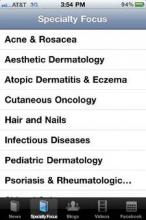• ORLive (BroadcastMed)
• AccessSurgery (McGraw Hill)
• MedlinePlus (U.S. National Library of Medicine and National Institutes of Health)
• Medical Videos (Bliss)
Dr. Ashish Bhatia and one of his coauthors, Mr. Kyle Bhatia, are unpaid authors and editors for video content on www.VirtualDermSurg.com.
Decision Support Tools
Clinical decision support (CDS) tools have come a long way in recent years, and with increasing use and acceptance of electronic resources and mobile devices, the growing number of CDS systems can be of great benefit, according to Dr. Art Papier.
"CDS systems have the potential to increase a physician’s cognitive awareness, help them recognize their knowledge limitations, and assist with problem solving and decision making in a specific patient context," wrote Dr. Papier, of the University of Rochester, N.Y.
Specific areas of diagnostic CDS addressed by Dr. Papier include those that relate to medication reactions, geographic relationships, and allergic contact dermatitis (Sem. Cut. Med. Surg. 2012;31:153-9).
• Medication reactions. Clinicians too often fail to promptly identify, classify, and diagnose a problem, and many available CDS systems provide too little information to help. However, two CDS systems that provide fuller differentials for possible adverse drug reactions are Litt’s DERM (Drug Eruption Reference Manual) Database and the drug eruption module in VisualDx.
• Geographic relationships. There are two designed CDS systems that search by state or country for infectious disease relationships: GIDEON (Global Infectious Diseases and Epidemiology Online Network) and VisualDx. "GIDEON is a diagnostic Web application covering the relationships of more than 340 infectious diseases and 231 countries. The database is searchable by country, symptom, exposure, or medication," wrote Dr. Papier. VisualDx is similar, and also covers infectious diseases that present with cutaneous findings, and allows users to search by lesion type, endemic country, exposures, medications, laboratory findings, and body location. The systems can be especially useful for recalling the relationships between foreign travel and infectious disease exposure.
• Allergic contact dermatitis. Dr. Papier recommended the American Contact Dermatitis Society’s CARD (Contact Allergen Replacement Database), which is part of the Society’s CAMP (Contact Allergen Management Program) database. This CDS has "great potential to guide the patient history, assessment, and eventual patient recommendations" in these cases, he said.
Technology has much to offer dermatology practices.
"As we are still at the beginning of this digital revolution in health care, a future with further innovation is certain. This future will certainly lead to new approaches and care delivery methods that will make our dermatology practices safer, more reliable, and consistent in care delivery," he wrote. "Our patients will wonder what took us so long."
Dr. Papier is the chief medical information officer for Logical Images, developer of VisualDx.
Smart Phone Apps
The number of available applications for smart phones and tablet computers has increased by more than 500% since 2009, according to Dr. Suneel Chikukuri of Baylor College of Medicine, Houston, and his colleague.
Determining which mobile applications provide the most benefit can be an overwhelming task. However, they narrowed it down, and recommended several apps most relevant for the dermatologist (Sem. Cut. Med. Surg. 2012;31:174-82).
The "textbook" apps Dr. Chikukuri and his colleague recommended included Fitzpatrick’s Color Atlas & Synopsis of Clinical Dermatology ($74.99), Derm Atlas ($7.99), A2Z of Dermatology ($3.99 iPhone and $2.99 iPad), and Color Atlas of Pediatric Dermatology ($129.99).
Among the continuing medical education apps they recommend are iMCQs in Dermatology ($2.99) and Dermatology In-Review Kodachrome Flashcard Series (free).
The authors also reviewed a number of diagnostic apps, specifically recommending Pocket Derm ($0.99), iRash ($2.99), Visual Dx Mobile ($150 per year), and Derm 101 (free with http://derm101.com subscription);
As for resource apps for patients, they recommended UV Index ($0.99), Skin of Mine (free), Skin Advocate (free), and CARD (free).
And lastly, for journal and news apps, they recommended Skin & Allergy News (free) and Skin Therapy Letter (free).
"Mobile platforms are revolutionizing the practice of medicine by providing convenient access to information. The aforementioned apps will help the practitioner improve their diagnostic resources without cumbersome textbooks. Patients will appreciate the up-to-date information, and the ability to better understand their diagnosis and treatments without access to a medical library," they concluded.
Dr. Chikukuri and his colleague reported having no conflicts of interest.
The iPad
The use of portable tablet computers, such as the iPad, is expanding in the clinical setting, with the devices serving as both a reference and patient education tool, reported Dr. Jeffrey T.S. Hsu of the department of dermatology at Dartmouth Medical School, Hanover, N.H, and his colleagues.



